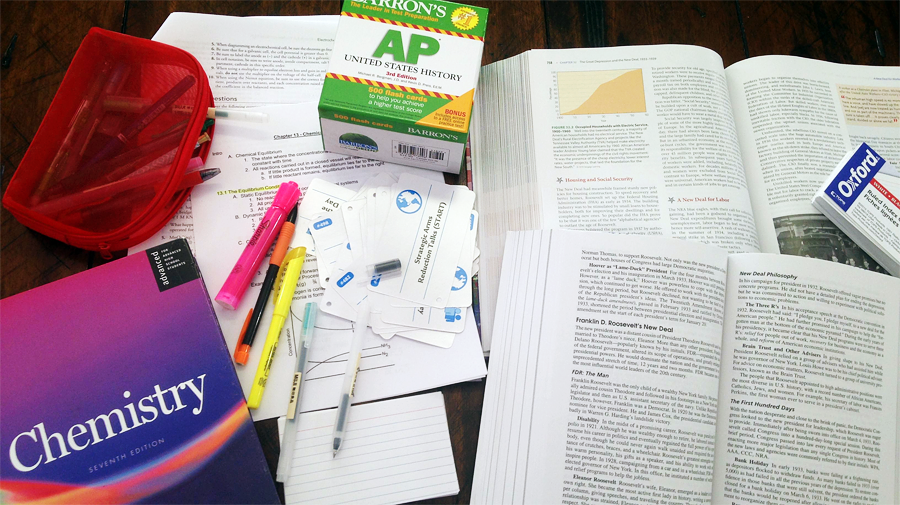Navigating AP exams
This work space shows the tools many Advanced Placement students use to navigate their coursework and exams. While saving work to be completed at the last minute may sometimes work, exercising organization and time management skills will prevent stress and be more rewarding in the long run.
April 20, 2017
As the month of May comes near, numerous students at the Mill look forward to finishing the school year and beginning their summer vacations. For students planning to take Advanced Placement exams, however, this time of the year can be rather stressful, especially for those who take multiple AP classes.
While AP season is more often than not a time of last-minute cramming, all-nighters, and overall distress, it doesn’t have to be that way. By following the tips below, one can not only avoid the stress associated with procrastination but also ensure success on every AP exam.
Familiarize yourself with each course’s expectations
The abundance of material taught in an AP course can be intimidating at first glance. As a result, it can be difficult to determine where to begin studying or the extent of information needed to be absorbed. Fortunately, the majority of, if not all, AP classes are each divided into several sections. AP World History, for instance, is divided into six chronological time periods, whereas the material covered in AP Psychology is split into fourteen major content areas. It is important to visit the College Board website and read the course overview for each AP exam in order to know what will be expected on testing day.
Test preparation companies, such as Barron’s and Princeton Review, have done an excellent job of providing booklets that summarize the material covered in each AP course as well as provide a generous amount of prompts and multiple choice questions to work with. If spending money on a new booklet is an issue, the school library or an AP teacher may have copies to spare. Thriftbooks also sells gently used, inexpensive booklets.
Plan accordingly
While cramming may sometimes work, creating a study regimen ahead of time virtually guarantees success in learning the material for an AP class and ultimately reduces stress in May. By failing to begin studying ahead of time, one is less likely to cover sufficient course material. “I regret waiting until the last minute to study for the AP World History exam last year,” junior Quynh Phan said. “If I had given myself more time to prepare for it, then I would have done better.”
Use the internet to your advantage
One notable advantage current high school students have is being able to browse the internet and make use of valuable resources at the tip of their fingers. Exploring YouTube content and websites like Khan Academy can provide a student with summarized information for an upcoming test. “Watching videos on YouTube has helped me perform well on my tests in AP Biology,” junior Bailey Christ said.
The internet’s growing prevalence has also allowed students with common goals to congregate on several platforms. A primary example of this trend is the “studyblr” network on Tumblr. Composed of determined students from throughout the globe, the online community provides extensive resources for various subjects, tips, and overall encouragement to do one’s best in school. “Being part of a supportive online group like ‘studyblr’ has been beneficial for me,” Christ said. “It makes me motivated to continue putting effort into my schoolwork.”
Look at previous free response questions and practice exams
It’s one thing to understand the material, but it’s another thing to be comfortable with the structure of an AP exam. One will be better prepared for an exam if he or she is aware of its format and timing for each section. Nearly every AP exam in May will consist of two sections: multiple choice and free response. Although the multiple choice questions from an official AP exam are never released on the internet, the free response questions and their answers are published by the College Board every year. Looking through previous free response questions can give a student an idea of what he or she will face on testing day.
Practice exams, which can easily be found on Google, can also prove to be helpful in terms of becoming accustomed to the types of questions that will be asked on both the multiple choice and free response questions.
Make wise decisions ahead of time
There is not much that can be accomplished the night before an AP exam in terms of studying, but one should always make the wise decision to go to bed early in order to wake up feeling refreshed. Eating breakfast in the morning also wouldn’t hurt. “Last year, I took the exams for AP Statistics and AP World History exams, both of which took place on the same day back to back,” junior Madison Martin said. “Eating breakfast was important to fuel me through both exams.”
Emphasis should also be placed on wearing comfortable layers of clothing that can be easily adjusted. Being in physical discomfort, whether from wearing tight clothes or not eating breakfast, oftentimes poses the risk of not performing to one’s full potential. “You have to be comfortable, or you won’t do well,” Martin said.
Beyond all advice, it is essential to remember that it’s only a test. Opting out from sending an undesired score to colleges is always a possibility for those who wish to do so. For the more ambitious individual, retaking the AP exam the following year is also an option. Nonetheless, it is worth putting effort towards receiving a decent score on the AP exam for the sake of earning college credit and potentially saving hundreds of dollars in tuition.








